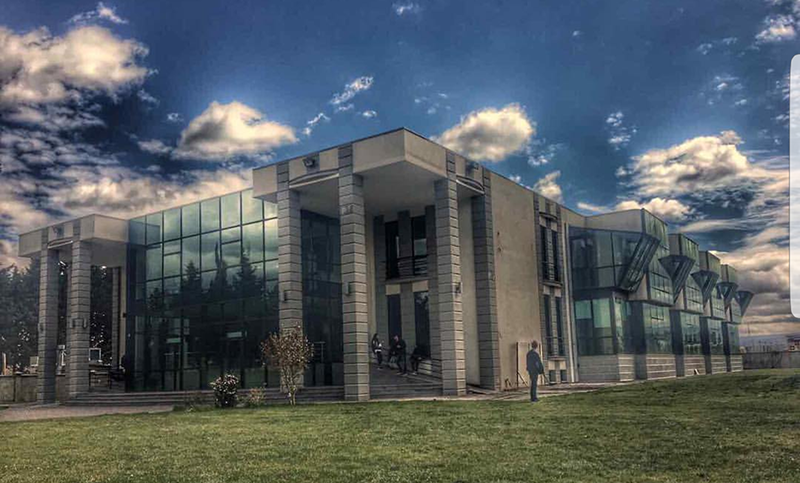MBBS In Georgia
Course duration 5 years only
Lowest Tution Fees
English is the medium of Instruction
Guaranted success in MCI/USMLE Test
Safest Country in the world
WHO/MCI Approved University
Free Online Mci Coaching From First To Last Year.
Free Medical Terminology Classes Before Departure.
Guaranteed Success In Mci/Usmle Test.
GRIGOL ROBAKIDZE UNIVERSITY

About GRIGOL ROBAKIDZE UNIVERSITY.
Grigol Robakidze University is established in 1992 in Tbilisi, Georgia. It specialises in Medical i.e Medicine and dentistry, but also has courses in the social sciences, English and German.
The university was renamed in honor of the Georgian poet and thinker, Grigol Robakidze. It is one of the oldest in nongovernmental (private) High Educational Institutions in Georgia.
In general, the aims of the MD Educational Program is preparing medical personnel with a range of competences compatible with the standards of World Federation of Medical Education (WFME) and the competences defined by the Tuning Project.
The MD Program Educational Program continues for 6 years and consists of 360 credits. Based on the European Credit System implementation each 19-week semester of an academic year comprises 30 credits. One credit involves 25 working hours, approximately half of which are intended for contact and other half – for students’ independent work.
The entire course takes six academic years – 12 semesters. For the student wishes, it is possible to complete the program in 5 years, if the student will accumulated 75 credits per year (within 4 yaers) instead of the standard 60 credits. The academic year involves 38 working weeks and consists of 2 semesters – fall semester (19 weeks) and spring semester (19 weeks). The semesters are separated by vacations.
The MD Program is widely integrated and is based on the harmonious merging of basic science and clinical disciplines. The integration is achieved through the basic, pre-clinical and clinical disciplines of horizontal, vertical and spiral principles. The program includes stages, cycles and blocks and consists of two main stages: Initial Medical Stage and Clinical Medical Stage. Every succeeding block is built on the previous one and sets more complex learning objectives.
The initial medical stage is a combination of major biomedical sciences with a duration of one semester (first semester).
Initial Medical Stage.
The duration of the Initial Stage is 1 semester. The Core Principles of the Biomedical Sciences are pivotal at this stage. The objective of this stage is the introduction of the fundamental principles and the related vocabulary that is applicable to each of the basic sciences, providing the basic knowledge for learning the human organ systems during the following 4 semesters.
The horizontal and vertical integration is achieved by coordinating and integrating basic clinical sciences (Health Promotion and Scientific Research) and Professional Latin. Students will learn basics of health promotion, the methodology of search, critical analysis, literature review, research planning, data collection, statistical analysis and publishing of the results, effectively use the Latin terms in professional context.
Clinical Medical Stage.
The duration of the Clinical Medical Stage (330 credits) is 11 semesters, is widely integrated and consists of the Integrated Block I, II, III, IV (II, III, IV, V semesters), Transition Block (VI semester) and Clinical Rotation Cycle I, II, III, IV, V, VI (VII, VIII, IX, X XI, XII semesters).
The Integrated Blocks (II, III, IV, and V semesters) comprise of the organ system modules that allows the integrated teaching of basic molecular, cellular, and organ systems processes in conjunction with the disease processes. Sophisticated scientific information is introduced in a clinical context, illustrating its clinical relevance and enhancing the students’ learning.
Each module begins with a brief review of micro and macro structure and progresses through Human Anatomy, Physiology, Histology, Cytology, Embryology and Biochemistry of the subject organ system. The horizontal and vertical integration is achieved by coordinating and integrating between basic and clinical sciences courses.
Integrated Organ Systems courses are vertically linked to the principles of Patient Care, clinical and communication skills, core values of medicine, basics of Pathology and Immunology, Microbiology, Virology, Parasitology, research methods and are accompanied by teaching basic principles of Health Care Management, Medical Psychology, Preventive Medicine, fundamentals of Pharmacology, creating 5 modules for learning the organ systems.
The learning methodologies used in organ system modules include lectures, group-work, discussions, demonstrations and self – study, PBL sessions
In order to refine practical medical skills and ensure adequate learning of the methods of timely diagnosis and proper treatment in the given clinical cases, clinical skills teaching is delivered stepwise way. Elaboration of Students’ clinical skills is performed on the basis of five academic course (total 14 credits).
The training of student to research skills is performed based on 3 academic courses of the principles of scientific research, which in total equals to 10 credits, of them 7 credits are devoted to theoretical aspects and the remaining 3 credits to research work.
Transition Block.
The Clinical Medicine Course continues with Transition Block, which links the study of pathological changes and disease symptoms with the practical comprehension of modern principles and methods facilitating the diagnostic process. The Block is organized in a way that allows the learning of general aspects of Evidence Based Medicine, Physical Diagnosis, fundamentals of Systemic Pathology, Pharmacology, Radiology research methods and diagnostic techniques, common surgical diseases.
The course aims to develop fundamentals of clinical reasoning among students, focus on the use of theoretical knowledge in practice, analyzing patient examination data, interpretation of research results and enhancing clinical decision. Case based teaching (CBCR) method assures students’ active involvement in the study process.
Clinical Rotation Cycles.
The design of Clinical Rotations courses is based on the organ systems’ diseases-oriented studies and build upon previously acquired competences, deepening knowledge, mastering skills and developing values simultaneously setting higher-level complex objectives. Clinical Rotation Cycles provide for applying the students’ basic medical knowledge in clinical medicine and is related to the study of the treatment of diseases and syndromes in accordance with the latest clinical guidelines and protocols constructed by the evidence-based medicine. During the mentioned courses, students are involved in clinical activities – implements the function of Auxiliary Medical Staff (Clerkship).
Clinical Rotation Cycles (I, II, III, IV, V, VI) over the next 6 semesters (VII, VIII, IX, X, XI, XII). The extent of education in each semester are equal to 30 ECTS credits.
During the mentioned courses, the student works under supervision in an affiliated clinical institution and acquires a quality clinical experience.
Why should a foreign student study at Grigol Robakidze University?.
First – Georgia is an Associate Member of the EU.
Second – Georgian universities, among them Grigol Robakidze University joined the Bologna process in 2005.
Third – Grigol Robakidze University is the only university in Georgia that has the campus of European type. Its architectural conception differs from other university buildings existing in Georgia. What is its originality?
- Like western universities, the campus of Grigol Robakidze University is located in the city suburb, on 15 000 km ecologically clean area (Aghmashenebeli Alley, 13th kilometer, the US Embassy adjacent territory).
- It is not a multistory building what is regarded to be an international standard from the viewpoint of students’ security and for creating a united academic/communication space.
- The building is provided with ventilation and conditioning systems what makes the highly comfortable environment for studying any time of the year.
- Students are given the opportunity to carry out educational and creative activities in nonstandard, functionally differentiated classrooms equipped with audio-visual technique.
- A lounge-club and an original recreational space are available to students what enables them to fully relax.
- The campus comprises educational-scientific and entertainment/sport space as well as a dormitory having 101 single rooms. Each room has a refrigerator, a toilet and a bathroom with a washing machine. At students’ request, it is possible to place two beds in 75 rooms out of 101 what will give them the opportunity to share the accommodation fee. (Other universities in Georgia do not have a dormitory).
- The University has its representation in Batumi, on the seashore, with modern infrastructure, its own beach. Batumi representation runs several programmes.
Fourth – the academic staff of the University, Georgian and foreign professors are well known not only in Georgia, but also beyond its scopes. Foreign professors systematically visit the University and conduct lectures.
GRIGOL ROBAKIDZE UNIVERSITY Fees.
| GRIGOL ROBAKIDZE UNIVERSITY | 1st Year | 2nd Year | 3rd Year | 4th Year | 5th Year |
|---|---|---|---|---|---|
| Tuition Fees/Year in US Dollars | 4500 USD | 4500 USD | 4500 USD | 4500 USD | 4500 USD |
| Total in Indian Rupees/Per Year | 3,15,000 INR | 3,15,000 INR | 3,15,000 INR | 3,15,000 INR | 3,15,000 INR |
What does Georgia’s joining to the Bologna process mean for Grigol Robakidze University?.
Grigol Robakidze University diploma and degree, compatibility of educational programmes, implementation of exchange and joint programmes with leading universities of Europe.
For foreign students it means that they can obtain education of European type – diploma and degree, paying much lower costs as tuition fee and leaving expenses in Georgia are much lower than in Europe, though quality is European.
It is proved by the accreditation of Grigol Robakidze University by the Government of Georgia, a number of international projects and awards that the university received namely for high quality education. We present the main achievements:
2001 – Grigol Robakidze University won the project of the European Union which envisaged starting of the complete reform of the educational system of Georgia and implementation of pilot programmes at our University (moving to three-level education, working out and implementing modular educational programmes, moving to ECTS credits, implementing quality assurance system). Due to everything this, the university appeared on the leading positions in comparison with other universities.
2005 – The University received the letters of gratitude from His Excellency the US President Mr. George Bush and the Secretary of States Ms. Condoleezza Rice for translating and publishing Ten Federalist Papers
2012 – The Rector of Grigol Robakidze University was named as the Rector of the Year.
2013 – The Publishing House “Sakheebi” named Grigol Robakidze University as a “Golden Partner”.
2013-2014 – Grigol Robakidze University was named as the winner in the nomination “Trust and Reputation”.
2015 – The Union of National Business Ratings named Grigol Robakidze University as a “Leader of the Field”.
2016 – The Media Holding “Tbiliselebi” named Grigol Robakidze University as the “University of the Year”.
2016 – Grigol Robakidze University became the affiliate of Harvard Business School what enables our University to use their programmes, text-books and other resources.



